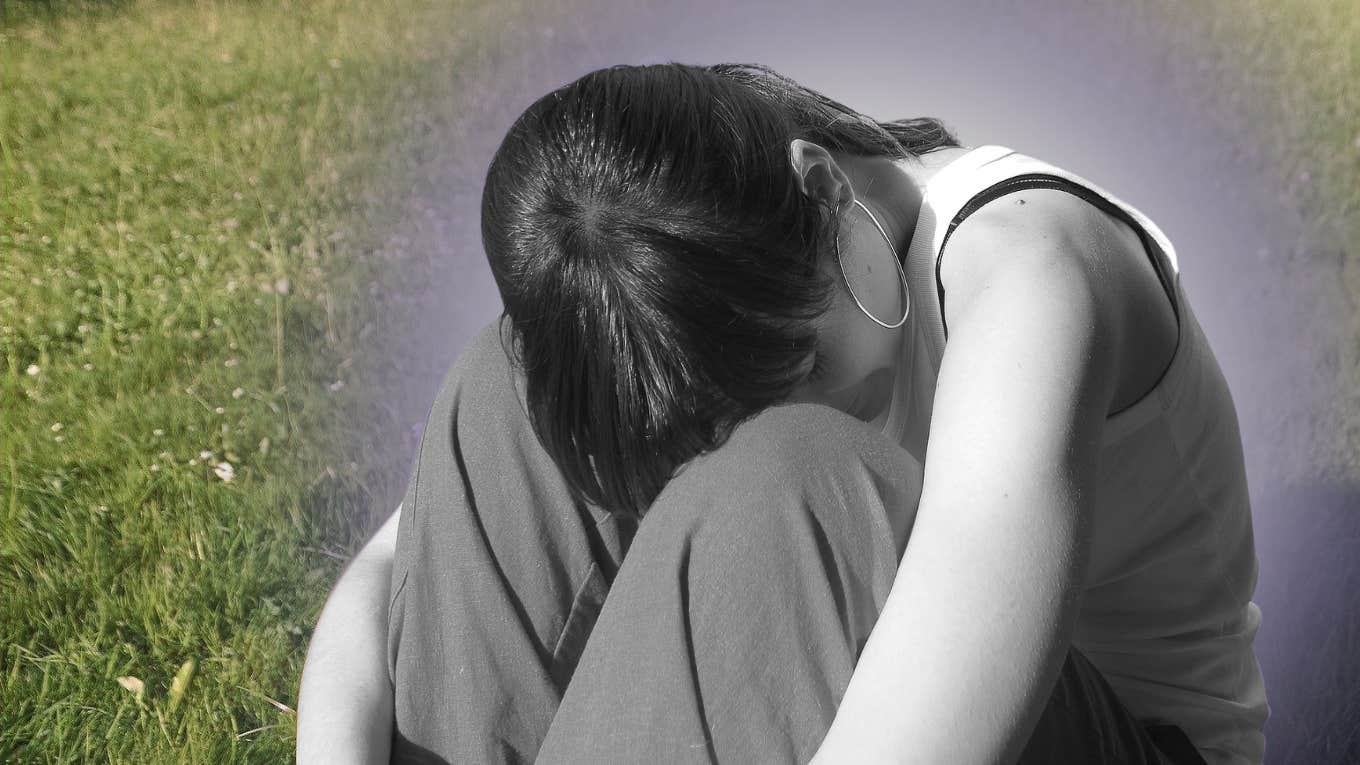10 Tiny Ways To Be 75% Less Sad
We're wired to react emotionally to stressful situations in one of three predominant ways: anger, fear, or sadness.
 amayaeguizabal | Canva
amayaeguizabal | Canva The numbers are staggering. In the United States alone, it is estimated that 18.8 million people suffer from a depressive disorder in any given year. That translates into nearly 10% of the US population. Worldwide, that number is estimated at more than 120 million. According to the American Medical Association, more than twice as many women (estimated at 25% of the population) experience depression as men (estimated at 12%), regardless of racial background or financial status. The US Commission on Mental Health concluded that 14% of the people living in the US will require treatment for emotional disturbances at some point in their lifetimes. A study by the World Health Organization entitled “Global Burden of Disease” showed that major depression is the leading cause of disability worldwide among people aged 5 and older. It is the leading cause of disability in the USA for ages 15 to 44.
It's reported that the estimated cost to employers in loss of productivity and absenteeism from work is $51 billion per year, not counting the cost of treatment or prescription medications. The Center for Mental Health Services estimates that 12% of school-age children are maladjusted showing signs of clinical depression and as many as 6% suffer from psychoses. The American Society on Aging reported that there are three suicides for every two homicides. Up to two-thirds of older adult suicides are attributed to misdiagnosed or untreated depression. Suicide is the third leading cause of death among 15 to 24-year-olds and the fourth leading cause of death in 10 to 14-year-olds according to the American Association of Suicidology.
People with depression are four times more likely to develop a heart attack than those without a history of depression reports the National Institute of Mental Health. Brown University Long Term Care study reports that about 6 million elderly suffer from depression but only 10% of them receive treatment. Research shows that children of depressed mothers score lower on mathematical achievement tests. Children between the ages of two and four with depressed mothers are more likely to display delayed development. Chronic depression results from long-term addiction to sadness with diminished self-esteem. Allow me to explain…
As human beings, we all are wired to react emotionally to stressful situations in one of three predominant ways: anger, fear, or sadness. This reactive nature likely began early in childhood for those who find themselves chronically depressed…when someone says or does something to “make” them sad. In that incident, the person bought into something negative or made something up about themselves, others, or the world in general that “made them sad” and diminished their self-esteem. From that point onward, they began the habit of accumulating evidence to reinforce whatever they decided, attracting situations and people that strengthened and compounded their addiction to sadness.
Much like a heroin addict addicted to that drug, the chronically depressed person proceeds to scan for and find reason after reason to become depressed. She or he becomes adept at buying into the negativity of others or interpreting situations in such a way that reinforces whatever it was that caused them to feel sad during previous upsetting events. Depressed individuals even unwittingly tend to attract people and circumstances that allow them to “get their fix” of sadness. Those who develop this addiction to sadness often abdicate responsibility for creating a different reality because of all of the frequently invisible, contrary benefits they receive by being sad. These include…
* They get to feel sorry for themselves.
* They get to evoke the sympathy of others.
* They get to be victims.
* They get to avoid responsibility for turning their situations around.
* They get to be right about how unfair things are.
* They get to make others wrong about something.
* They get to control others with their depression or avoid being dominated by them.
Now, don’t get me wrong. Chronic depression is a genuine condition — so real that brain chemistry becomes altered and if left untreated, can cause the depressed person to spiral downward into a self-destructive, debilitating state/
Here are 10 things you can do to turn your sadness around:
1. Take responsibility for doing whatever it takes to honor your most important core values
Your values are the threads that form the fabric of who you are at your core. If love, creativity, freedom, belonging, adventure, respect, security, or other key values are being dishonored, identify what is needed to live in a manner that honors them.
2. Manage your negative thoughts
Create empowering interpretations for all daily events. Know that every challenging situation holds for you a gift for your personal growth and development. Embrace life as a continual learning process and look for the wisdom that will come from every problematic situation and difficult person.
3. Adopt an attitude of gratitude as you go about your day
It’s impossible to be grateful and feel self-pity simultaneously. Look for the good in every situation. Make every day your personal Thanksgiving day!
 Pexels / Marcus Wöckel
Pexels / Marcus Wöckel
4. Take on an empathetic point of view during all upsetting situations
Remind yourself that everyone operates in alignment with how they view the world and to protect themselves from hurt and harm. Ask yourself, “What must it be like in the other person’s world to have them say or do what they did?” Decide to find the behavior of other people as interesting rather than offensive.
5. Give up your right to take things personally
Please don’t buy into the negative opinions or distorted perspectives of others when they don’t support your happiness. Counter anger with love and fear with understanding.
6. Decide to forgive those who hurt you
Know that every experience — and especially the traumatic ones – contains insights and gifts that contribute to your level of wisdom and empathy. Adopt the interpretation that you need the experiences to add to your spiritual growth so that you can use this acquired wisdom to contribute to the lives of others. By forgiving others, you complete with your past pain and open the door to being able to forgive yourself and move on to happier times.
 Pexels / Ketut Subiyanto
Pexels / Ketut Subiyanto
7. Hire a coach to support you in embracing the process of personal development
Realize that every experience has prepared you to gain in your ability to contribute your gifts to others. Have the courage to decide to live from a newly invented declaration that represents the person you have decided to be rather than what the negative evidence of the past dictates. Fall in love with the learning process as you become a student of your behavior and that of others.
8. Reinvent yourself
Create a powerful and inspiring vision for your future. Write out your vision for your life in 1, 3, 5, and 10 years, describing in detail what you will have, do, and be known for as well as who you will contribute to. Describe in detail all 6 key areas of your life including your health and appearance, wealth and finances, job or business, relationships, personal and spiritual development, and how you will have fun, recreate, and pursue your passions. Take daily actions that support those goals that align with that compelling vision.
9. Decide to have fun and live with passion
Hire a fun coach who can challenge you to add fun activities to your daily life. Explore new hobbies, and interests, and develop new passions and friendships. Do at least 1 new fun activity every single day for yourself.
10. Take the focus off yourself and your petty concerns
Find other people or worthwhile causes to contribute your time and energy. Decide to make everyone’s day a bit better than you found them. Volunteer at a homeless shelter, nursing home, or hospital. Give to others freely and watch what you’ll receive in return. When you make the daily conscious decision to be happy moment by moment and manage your addiction to sadness by shifting your thought process the moment you feel the least bit blue, your world will miraculously transform for the better.
If you or somebody that you know is experiencing a mental health crisis, there is a way to get help. Call SAMHSA’s National Helpline at 1-800-662-HELP (4357) or text "HELLO" to 741741 to be connected with the Crisis Text Line.
Dr. Joe Rubino is an internationally acclaimed expert on the topic of self-esteem, a life-changing personal development trainer and success coach, and best-selling author of 11 books and multiple audio sets and videos on topics ranging from how to restore self-esteem, achieving business success, maximizing joy and fulfillment in life and productivity in business.

